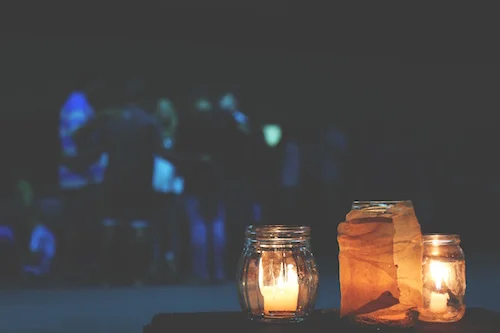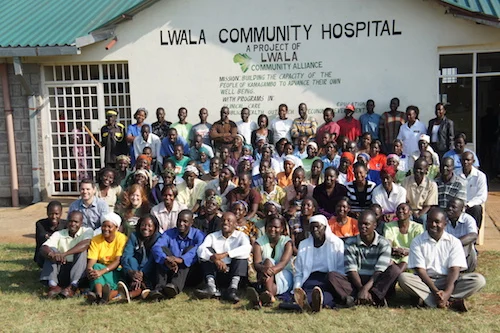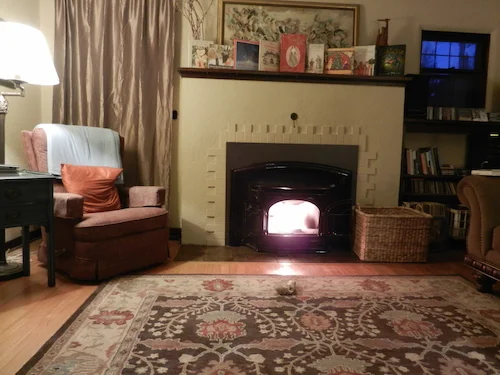I cannot make my neighbors less fearful, uncertain, or afraid. I cannot change the world or stop the violence. I can, however, in my little place on the margin of life, faithfully seek to live, think, and speak hopefully. Perhaps it will be a spark that will spread more widely and do some good—after all, hope is life-giving, generative. Perhaps not, but that is not my concern. My concern is to make culture faithfully, culture that will encourage people to flourish in this broken world. And being hopeful is culture making because creativity and art and flourishing is impossible without hope.
All in Justice
Back to the Garden
Perhaps like these women and the little girl, and maybe like others who feed people as part of a parenting vocation or faith community, I see the garden through the lens of my own faith and call to mothering and being mothered, the garden as a connection to nourishment and solace.
And to redemption. A safe haven where I might receive life and pass it on, or get it back from the edge of death.
Objection Sustained
If the need for approval is analogous to the need for a drug, I’m never going to be cured. And I don’t think that’s admitting defeat. It’s giving up the charade that we’re rational animals capable of self-sufficiency, which is neither true of our bodily needs—cities, police, and Wi-Fi are things I want to keep—or of our emotional needs—to be listened to, to be agreed with, and to be congratulated, every so often.
After the state championship, the real world came crashing in and told me that I wasn’t perfect.
Advent: Calling the Dreamers and Realists, Prophets and Pragmatists
Advent is the time when longing and unmet desires meet celebration and fulfillment, holding the two ends of the spectrum of our human experience in tension without denying either of them. Grief and hope, pain and joy together. Because honestly, how often are we not feeling both simultaneously in some way?
The Ritual of Returning (to Kenya)
As much as I miss the surety of my childhood idea of home, I am grateful for the tension that stretches me between two continents. I am drawn back not as an explorer or safari gazer who longs for Africa in the naïve and ideal sense, but because I love what Africa has become for us — a place where we belong, a kind of home. And I know that some day when this ritual of returning to Kenya becomes less regular, I will be homesick.
Conversations About Race
Eight years ago, the life paths of three women — one black, one white, one multi-racial — crossed, and a unique friendship was born. The topic of race was central from the inception, and we shared a fundamental sense that we needed one another as we explored the terrain of race. Despite the fact that many of our conversations over the years have been difficult and sensitive, they’ve also been beautiful.
The Mother & Child Project
The role of the artist in society is unique. Unlike bankers, teachers, police officers, senators, doctors, or professors, artists stand at the margins of society and write poetry and prose rife with metaphor and images as a kind of prophetic voice, hopefully with a vision of truth and love. This vision can empower community, uplifting the vulnerable, and provide a newfound hope for a better life for all. The artist has the power to bend language to her will to get “between the lines” of poetry to allow what the Bible calls “true religion” to emerge. With this perspective, there is beauty, clarity, and pure advocacy.
Seldom Suppress a Generous Impulse
When I was young, it struck me as strange that my father enjoyed giving so much, but years later, I am finally beginning to understand. He has become so accustomed to the thrill of working alongside his heavenly father to care for the needs of others that temporal goods have lost hold on his affections. As the earthly tent wears thin, he sees with ever increasing clarity the bountiful riches of God’s economy. One day, I hope that I will see it too.
Find the Good and Praise It
Like it or not, I have been fine-tuned since childhood to feel the weight of the world’s woes more than most, perhaps like you who read the Art House America Blog (or write for it). Luci Shaw calls it the poet’s curse, this heightened sensitivity to life’s joys and sorrows. We can’t not feel what we feel. I couldn’t agree more and yet the nagging question for me comes down to this: how do we find the good and praise it in the midst of so much suffering? How do we flesh out our callings with lives of deep joy and courage? These questions haunt me year after year. I can’t promise much in the way of satisfying answers, only glimmers, a semblance of peace.
Repairing the World
Even with the best hopes, the truest motives, we will get hurt, because the world is very messy. Stepping in, even with responsibility born of love, is never neat-and-clean. To take up the wounds of the world will wound us, as it did God himself — which is why the heart of our vocation must be the imitation of the vocation of God. Nothing else can so form us, nothing else can so sustain us.
The Graduation Card
If I was looking for a card for an 18-year-old high school graduate, I’d still have my usual inner turmoil, but it would be a little different story. In this case, our graduating friend is in his 40s, getting his master’s degree after a two-year program at a university in the U.S. that is 7,000 miles away from his wife and children and community in Africa. English is his third language — he only heard it spoken for the first time 10 years ago. He comes from an economically poor community that has experienced a great deal of trauma, and he will be returning there soon.
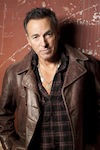 “We do not have to live as if we are alone.” One would not be hard pressed to interpret a large percentage of Bruce Springsteen’s extensive catalogue of songs over the last thirty-something years as attempts to communicate the same message. The role of an artist in our world today surely includes, among other things, the task of expanding our moral imagination . . .
“We do not have to live as if we are alone.” One would not be hard pressed to interpret a large percentage of Bruce Springsteen’s extensive catalogue of songs over the last thirty-something years as attempts to communicate the same message. The role of an artist in our world today surely includes, among other things, the task of expanding our moral imagination . . .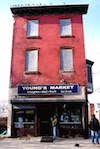 When we moved away from Franklin, I said we’d never be able to return to such a small town with its small thoughts, but that was before I was so tired. I still wrestle with feeling like I sold out. I still don't know exactly how to live out the Isaiah 55 call in a small-town context. It's not as clear. The real dramatic, tension-filled moments of triumph or defeat are not as visible. Here, the beauty and affluence shadow the brokenness.
When we moved away from Franklin, I said we’d never be able to return to such a small town with its small thoughts, but that was before I was so tired. I still wrestle with feeling like I sold out. I still don't know exactly how to live out the Isaiah 55 call in a small-town context. It's not as clear. The real dramatic, tension-filled moments of triumph or defeat are not as visible. Here, the beauty and affluence shadow the brokenness.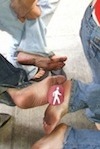 My hope is to spend my waking hours working on something I’m connected to — something that is excellent and meets needs beyond myself. I want to work alongside creative people who are making a larger impact on the world around them. I want to help them thrive. My desire is to have the freedom to invest my waking hours exhausting all of my faculties — my strengths, my skills, my passions — on behalf of a cause I'm passionate about. And yes, even a cause that needs me.
My hope is to spend my waking hours working on something I’m connected to — something that is excellent and meets needs beyond myself. I want to work alongside creative people who are making a larger impact on the world around them. I want to help them thrive. My desire is to have the freedom to invest my waking hours exhausting all of my faculties — my strengths, my skills, my passions — on behalf of a cause I'm passionate about. And yes, even a cause that needs me.Justice and the Pivotal Moment
History is watching. The story of how we are reacting to disease and extreme poverty and hunger is being written. How are you using your imaginative and creative abilities to tell a good story? Art is about making, but it is never better than when it accompanies a life well made. Set your compass toward living a seamless creative life where the full weight of your gifts are offered to the great needs of the world, from the need for beauty to the need for vaccines for the poorest children. This is the just and artful life.
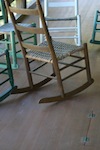 One of the places I felt most welcome in Canada was church. After leaving our first church in Ontario, we attended four different churches over seven years, but I felt at home in all of them in different ways. In all of those churches, worship included singing songs from all over the world, and we often sung in different languages. I heard the story of a world promised to us, where all people have a home and family.
One of the places I felt most welcome in Canada was church. After leaving our first church in Ontario, we attended four different churches over seven years, but I felt at home in all of them in different ways. In all of those churches, worship included singing songs from all over the world, and we often sung in different languages. I heard the story of a world promised to us, where all people have a home and family. To be sure, we don’t strive for proximate justice. Who wants to strive for an incomplete or imperfect Kingdom? By its very definition shalom means all things as they should be, in right relationship. But we do need an understanding of proximate justice to help us wait until then, even as we strive daily toward shalom in all corners of creation.
To be sure, we don’t strive for proximate justice. Who wants to strive for an incomplete or imperfect Kingdom? By its very definition shalom means all things as they should be, in right relationship. But we do need an understanding of proximate justice to help us wait until then, even as we strive daily toward shalom in all corners of creation. I’m hardly the first person to point out that the semantic confusion between “worship” and “music” has been damaging to both “worship” and “music.” This is not to say that the relationship between the two must be severed. On the contrary, I believe worship and the arts are linked in essential ways. But I also believe a third idea must be introduced in order for us to come to a fuller understanding of that relationship. That idea is “Justice.”
I’m hardly the first person to point out that the semantic confusion between “worship” and “music” has been damaging to both “worship” and “music.” This is not to say that the relationship between the two must be severed. On the contrary, I believe worship and the arts are linked in essential ways. But I also believe a third idea must be introduced in order for us to come to a fuller understanding of that relationship. That idea is “Justice.”  In recent years, institutional kidnappings and "show" trials of American citizens by anti-Washington governments, such as the Andrew Berends matter in Nigeria, the Euna Lee and Laura Ling case in North Korea, the Roxana Saberi case in Iran, and my case in Nicaragua have either become more common, or news desks have simply started reporting them with increasing frequency. As each of our cases played out, we were referred to as "criminal defendants" by the host country's government, but in reality, we were hostages — valuable leverage chips in the eyes of our captors.
In recent years, institutional kidnappings and "show" trials of American citizens by anti-Washington governments, such as the Andrew Berends matter in Nigeria, the Euna Lee and Laura Ling case in North Korea, the Roxana Saberi case in Iran, and my case in Nicaragua have either become more common, or news desks have simply started reporting them with increasing frequency. As each of our cases played out, we were referred to as "criminal defendants" by the host country's government, but in reality, we were hostages — valuable leverage chips in the eyes of our captors.














